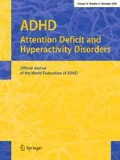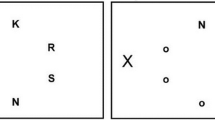Abstract
This study examined the psychometric properties, convergent validity, and divergent validity of a Japanese translation of Barkley (The Barkley adult ADHD rating scale–IV, Guilford Press, New York, 2011) rating scale for assessing sluggish cognitive tempo (SCT) in adults. In total, 429 Japanese adults participated across three samples: 26 diagnosed with attention-deficit/hyperactivity disorder (ADHD; ages 19–50), 81 adults without ADHD (ages 22–65), and 322 university students (ages 18–27). All participants completed rating scales of SCT, ADHD, anxiety, and depressive symptoms. A subset of participants completed the SCT measure at two time points two weeks apart. The SCT measure (5 items) showed acceptable levels of internal consistency and test–retest reliability. This scale also demonstrated convergent and discriminant validity, as evidenced by factor analyses between SCT and ADHD inattention (ADHD-IN) symptoms as well as adequate fit of a four-factor model involving SCT, ADHD-IN, ADHD-hyperactivity/impulsivity (ADHD-HI), and internalizing symptoms. Additionally, SCT and ADHD-IN dimensions were differentially associated with ADHD-HI and internalizing factors. The ADHD group scored higher on SCT ratings compared to the student and adult non-ADHD groups even after controlling for the severity of ADHD and internalizing symptoms. The 5-item SCT measure appears reliable and demonstrates preliminary evidence of validity in Japanese adults, providing initial support for the transcultural validity of the SCT construct. Additional studies are needed to further evaluate the SCT items that did not meet criteria for convergent and discriminant validity in the current study, and to examine functional outcomes of individuals recruited based on clinically elevated SCT symptoms.
Similar content being viewed by others
References
American Psychiatric Association (2013) Diagnostic and statistical manual of mental disorders, 5th edn. American Psychiatric Association, Washington
Barkley RA (2011) The Barkley adult ADHD rating scale–IV. Guilford Press, New York
Barkley RA (2012) Distinguishing sluggish cognitive tempo from attention-deficit/hyperactivity disorder in adults. J Abnorm Psychol 121:978–990. https://doi.org/10.1037/a0023961
Barkley RA (2014) Sluggish cognitive tempo (concentration deficit disorder?): current status, future directions, and a plea to change the name. J Abnorm Child Psychol 42:117–125. https://doi.org/10.1007/s10802-013-9824-y
Becker SP (2017) For some reason I find it hard to work quickly: introduction to the special issue on sluggish cognitive tempo. J Atten Disord 21:615–622. https://doi.org/10.1177/1087054717692882
Becker SP, Barkley RA (2018) Sluggish cognitive tempo. In: Banaschewski T, Coghill D, Zuddas A (eds) Oxford textbook of attention deficit hyperactivity disorder. Oxford University Press, Oxford, pp 147–153
Becker SP Sluggish cognitive tempo: the need for global inquiry. World Psychiatry (in press)
Becker SP, Langberg JM, Luebbe AM, Dvorsky MR, Flannery AJ (2014a) Sluggish cognitive tempo is associated with academic functioning and internalizing symptoms in college students with and without attention-deficit/hyperactivity disorder. J Clin Psychol 70:388–403. https://doi.org/10.1002/jclp.22046
Becker SP, Marshall SA, McBurnett K (2014b) Sluggish cognitive tempo in abnormal child psychology: An historical overview and introduction to the special section. J Abnormal Child Psychol. https://doi.org/10.1007/s10802-013-9825-x
Becker SP, Leopold DR, Burns GL, Jarrett MA, Langberg JM, Marshall SA, McBurnett K, Waschbusch DA, Willcutt EG (2016) The internal, external, and diagnostic validity of sluggish cognitive tempo: a meta-analysis and critical review. J Am Acad Child Adolesc Psychiatry 55:163–178. https://doi.org/10.1016/j.jaac.2015.12.006
Becker SP, Garner AA, Tamm L, Antonini TN, Epstein JN (2017) Honing in on the social difficulties associated with sluggish cognitive tempo in children: Withdrawal, peer ignoring, and low engagement. J Clin Child Adolesc Psychol. https://doi.org/10.1080/15374416.2017.1286595
Becker SP, Burns GL, Garner AA, Jarrett MA, Luebbe AM, Epstein JN, Willcutt EG (2018) Sluggish cognitive tempo in adults: psychometric validation of the Adult Concentration Inventory. Psychol Assess 30:296–310. https://doi.org/10.1037/pas0000476
Belmar M, Servera M, Becker SP, Burns GL (2017) Validity of sluggish cognitive tempo in South America: an initial examination using mother and teacher ratings of Chilean children. J Atten Disord 21:667–672. https://doi.org/10.1177/1087054715597470
Bernad MM, Servera M, Grases G, Collado S, Burns GL (2014) A cross-sectional and longitudinal investigation of the external correlates of sluggish cognitive tempo and ADHD-inattention symptoms dimensions. J Abnorm Child Psychol 42:1225–1236. https://doi.org/10.1007/s10802-014-9866-9
Burns GL, Servera M, Bernad MM, Carrillo J, Cardo E (2013) Distinctions between sluggish cognitive tempo, ADHD-IN and depression symptom dimensions in Spanish first-grade children. J Clin Child Adolesc Psychol 42:796–808. https://doi.org/10.1080/15374416.2013.838771
Burns GL, Becker SP, Servera M, Bernad MD, García-Banda G (2017) Sluggish cognitive tempo and attention-deficit/hyperactivity disorder (ADHD) inattention in the home and school contexts: parent and teacher invariance and cross-setting validity. Psychol Assess 29:209–220. https://doi.org/10.1037/pas0000325
Canino GL, Alegría M (2008) Psychiatric diagnosis—is it universal or relative to culture? J Child Psychol Psychiatr 49:237–250. https://doi.org/10.1111/j.1469-7610.2007.01854.x
Clark LA, Watson D (1991) Tripartite model of anxiety and depression: psychometric evidence and taxonomic implications. J Abnorm Psychol 100:316
Combs MA, Canu WH, Broman-Fulks JJ, Nieman DC (2014) Impact of sluggish cognitive tempo and attention-deficit/hyperactivity disorder symptoms on adults’ quality of life. Appl Res Qual Life 9:981–995. https://doi.org/10.1007/s11482-013-9281-3
Davis JM, Cheung SF, Takahashi T, Shinoda H, Lindstrom WA (2011) Cross-national invariance of attention-deficit/hyperactivity disorder factors in Japanese and U.S. University students. Res Dev Disabil 32:2972–2980. https://doi.org/10.1016/j.ridd.2011.05.004
Flannery AJ, Becker SP, Luebbe AM (2016a) Does emotion dysregulation mediate the association between sluggish cognitive tempo and college students’ social adjustment? J Atten Disord 20:802–812. https://doi.org/10.1177/1087054714527794
Flannery AJ, Luebbe AM, Becker SP (2016b) Sluggish cognitive tempo is associated with poorer study skills, more executive functioning deficits, and greater impairment in college students. J Clin Psychol. https://doi.org/10.1002/jclp.22406
Japanese WAIS-III Publication Committee (2006) Japanese Wechsler adult intelligence scale, 3rd edn. Nihon Bunka Kagakusya, Tokyo
Jarrett MA, Rapport HF, Rondon AT, Becker SP (2017) ADHD dimensions and sluggish cognitive tempo symptoms in relation to self-report and laboratory measures of neuropsychological functioning in college students. J Atten Disord 21:673–683. https://doi.org/10.1177/1087054714560821
Kessler RC, Adler LA, Gruber MJ, Sarawate CA, Spencer T, Van Brunt DL (2007) Validity of the World Health Organization Adult ADHD Self-Report Scale (ASRS) Screener in a representative sample of health plan members. Int J Methods Psychiatr Res 16:52–65. https://doi.org/10.1002/mpr.208
Khadka G, Burns GL, Becker SP (2016) Internal and external validity of sluggish cognitive tempo and ADHD inattention dimensions with teacher ratings of Nepali children. J Psychopathol Behav Assess 38:433–442. https://doi.org/10.1007/s10862-015-9534-6
Kirmayer LJ, Young A (1999) Culture and context in the evolutionary concept of mental disorder. J Abnorm Psychol 108:446–452. https://doi.org/10.1037/0021-843X.108.3.446
Lecrubier Y, Sheehan DV, Weiller E, Amorim P, Bonora I, Sheehan KH, Janavs J, Dunbar GC (1997) The Mini International Neuropsychiatric Interview (MINI). A short diagnostic structured interview: reliability and validity according to the CIDI. Eur Psychiatr 12:224–231. https://doi.org/10.1016/S0924-9338(97)83296-8
Lee S, Burns GL, Snell J, McBurnett K (2014) Validity of the sluggish cognitive tempo symptom dimension in children: sluggish cognitive tempo and ADHD-inattention as distinct symptom dimensions. J Abnorm Child Psychol 42:7–19. https://doi.org/10.1007/s10802-013-9714-3
Lee S, Burns GL, Beauchaine TP, Becker SP (2016) Bifactor latent structure of attention-deficit/hyperactivity disorder (ADHD)/oppositional defiant disorder (ODD) symptoms and first-order latent structure of sluggish cognitive tempo symptoms. Psychol Assess 28:917–928. https://doi.org/10.1037/pas0000232
Lee S, Burns GL, Becker SP (2017) Can sluggish cognitive tempo be distinguished from ADHD inattention in very young children? Evidence from a sample of Korean preschool children. J Atten Disord 21:623–631. https://doi.org/10.1177/1087054716680077
Lee S, Burns GL, Becker SP (2018) Toward establishing the transcultural validity of sluggish cognitive tempo: evidence from a sample of South Korean children. J Clin Child Adolesc Psychol 47:61–68. https://doi.org/10.1080/15374416.2016.1144192
Leikauf JE, Solanto MV (2017) Sluggish cognitive tempo, internalizing symptoms, and executive function in adults with ADHD. J Atten Disord 21:701–711. https://doi.org/10.1177/1087054716682337
Leopold DR, Bryan AD, Pennington BF, Willcutt EG (2015) Evaluating the construct validity of adult ADHD and SCT among college students: a multitrait-multimethod analysis of convergent and discriminant validity. J Atten Disord 19:200–210. https://doi.org/10.1177/1087054714553051
Leopold DR, Christopher ME, Burns GL, Becker SP, Olson RK, Willcutt EG (2016) ADHD and sluggish cognitive tempo throughout childhood: temporal invariance and stability from preschool through ninth grade. J Child Psychol Psychiatr 12:1066–1074. https://doi.org/10.1111/jccp.12505
Little TD (2013) Longitudinal structural equation modeling. Guilford Press, New York
Lunsford-Avery JR, Kollins SH, Mitchell JT (2018) Sluggish cognitive tempo in adults referred for an ADHD evaluation: a psychometric analysis of self- and collateral report. J Atten Disord. https://doi.org/10.1177/1087054718787894
Marshall SA, Evans SW, Eiraldi RB, Becker SP, Power TJ (2014) Social and academic impairment in youth with ADHD, predominately inattentive type and sluggish cognitive tempo. J Abnorm Child Psychol 42:77–90. https://doi.org/10.1007/s10802-013-9758-4
McBurnett K, Villodas M, Burns GL, Hinshaw SP, Beaulieu A, Pfiffner LJ (2014) Structure and validity of sluggish cognitive tempo using an expanded item pool in children with attention-deficit/hyperactivity disorder. J Abnorm Child Psychol 42:37–48. https://doi.org/10.1007/s10802-013-9801-5
Muthén LK, Muthén BO (1998-2014) Mplus user’s guide, 7th edn. Muthén & Muthén, Los Angeles
Nitobe I (1905) Bushido: the soul of Japan. G. P. Putnam’s and Sons, New York
Nomura K, Koizumi A (2016) Strategy against aging society with declining birthrate in Japan. Ind Health 54:477–479
Otsubo T, Tanaka K, Koda R, Shinoda J, Sano N, Tanaka S, Aoyama H, Mimura M, Kamijima K (2005) Reliability and validity of Japanese version of the Mini-International Neuropsychiatric Interview. Psychiatr Clin Neurosci 59:517–526. https://doi.org/10.1111/j.1440-1819.2005.01408.x
Piotrowski M, Kalleberg A, Rindfuss RR (2015) Contingent work rising: implications for the timing of marriage in Japan. J Marriage Fam 77:1039–1056
Rescorla L, Achenbach TM, Ivanova MY, Dumenci L, Almqvist F, Bilenberg N, Dobrean A, Döpfner M, Verhulst F (2007) Epidemiological comparisons of problems and positive qualities reported by adolescents in 24 countries. J Consult Clin Psychol 75:351–358. https://doi.org/10.1037/0022-006X.75.2.351
Sakano Y, Fukui T, Kumano H, Horie H, Kawahara K, Yamamoto H, Nomura S, Suematsu H (1994) Development and validation of a New Mood Inventory. Japn Soc Psychosom Med 34:629–636
Servera M, Sáez B, Burns GL, Becker SP (2018) Clinical differentiation of sluggish cognitive tempo and attention-deficit/hyperactivity disorder in children. J Abnorm Psychol 127:818–829. https://doi.org/10.1037/abn0000375
Tabachnick BG, Fidell LS (2006) Using multivariate statistics, 5th edn. Pearson, Boston
Takeda T, Tsuji Y, Uwatoko T, Kurita H (2015) Reliability and validity of ADHD diagnostic criteria in the Assessment System for Individuals with ADHD (ASIA): a Japanese semi-structured diagnostic interview. BMC Psychiatr 15:130. https://doi.org/10.1186/s12888-015-0525-7
Takeda T, Tsuji Y, Kurita H (2017) Psychometric properties of the Japanese version of the adult attention-deficit hyperactivity disorder (ADHD) self-report scale (ASRS-J) and its short scale in accordance with DSM-5 diagnostic criteria. Res Dev Disabil 63:59–66. https://doi.org/10.1016/j.ridd.2017.02.011
Tseng W, Chang SC, Nishizono M (2005) Asian culture and psychotherapy: an overview. In: Tseng W, Chang SC, Nishizono M (eds) Asian culture and psychotherapy: implications for east and west. University of Hawai’i Press, Honolulu, pp 265–279
Wakefield JC, Pottick K, Kirk SA (2002) Should the DSM-IV criteria for conduct disorder consider social context? Am J Psychiatr 159:380–386. https://doi.org/10.1176/appi.ajp.159.3.380
Wood WLM, Lewandowski LJ, Lovett BJ, Antshel KM (2017a) Executive dysfunction and functional impairment associated with sluggish cognitive tempo in emerging adulthood. J Atten Disord 21:691–700. https://doi.org/10.1177/1087054714560822
Wood WLM, Potts HE, Lewandowski LJ, Lovett BJ (2017b) Sluggish cognitive tempo and speed of performance. J Atten Disord 21:684–690. https://doi.org/10.1177/1087054716666322
Funding
The authors received no specific funding for this work. Stephen Becker is currently supported by award number K23MH108603 from the US National Institute of Mental Health (NIMH). The content is solely the responsibility of the authors and does not necessarily represent the official views of the National Institutes of Health (NIH).
Author information
Authors and Affiliations
Corresponding author
Ethics declarations
Conflict of interest
Dr. Becker has received research support from the National Institutes of Health (NIH) and the Institute of Education Sciences (IES). Dr. McBurnett has received research support from IES and Shire and has received presentation honoraria from Sunovion.
Ethical approval
All procedures performed in studies involving human participants were in accordance with the ethical standards of the institutional and/or national research committee and with the 1964 Helsinki Declaration and its later amendments or comparable ethical standards.
Informed consent
Informed consent was obtained from all individual participants included in the study.
Additional information
Publisher's Note
Springer Nature remains neutral with regard to jurisdictional claims in published maps and institutional affiliations.
Rights and permissions
About this article
Cite this article
Takeda, T., Burns, G.L., Jiang, Y. et al. Psychometric properties of a sluggish cognitive tempo scale in Japanese adults with and without ADHD. ADHD Atten Def Hyp Disord 11, 353–362 (2019). https://doi.org/10.1007/s12402-019-00300-z
Received:
Accepted:
Published:
Issue Date:
DOI: https://doi.org/10.1007/s12402-019-00300-z




